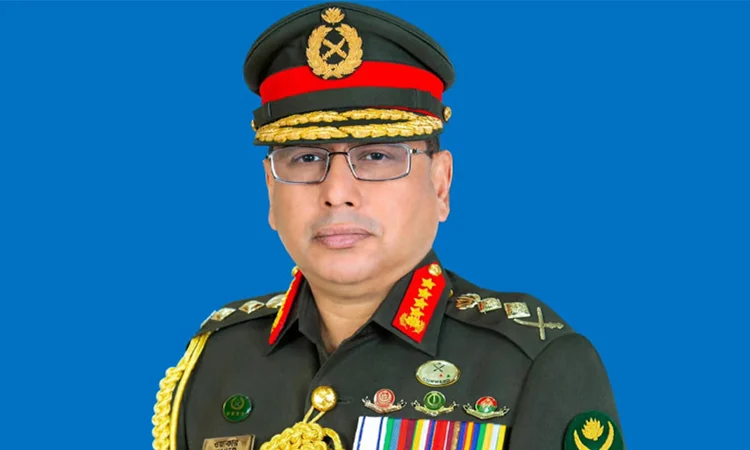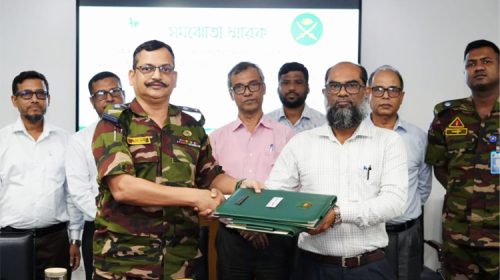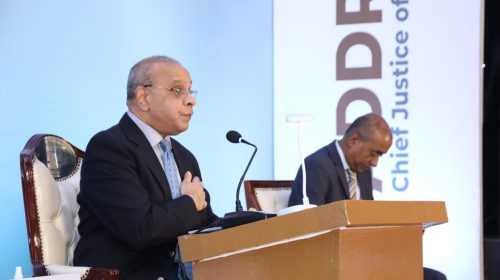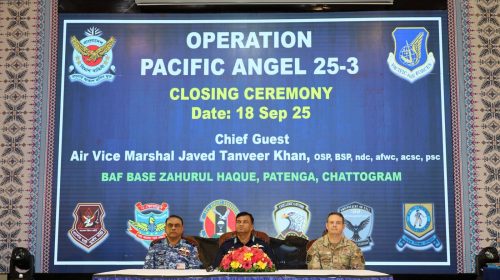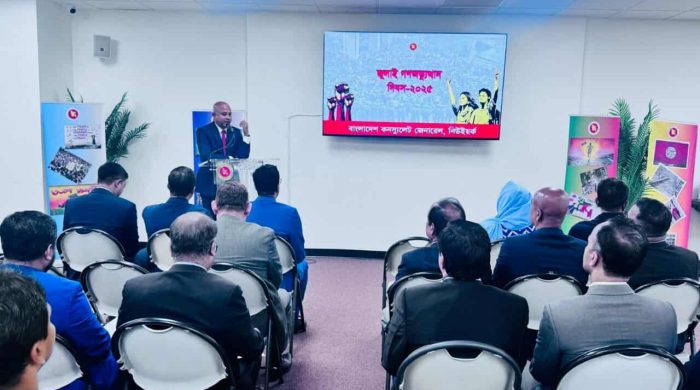Bangladesh missions abroad observed the July Uprising Day through various programmes to honour the martyrs and injured of the July Mass Uprising and recall the day that marks the downfall of autocratic ruler Sheikh Hasina.
To mark the occasion, Bangladesh Consulate General office in New York organized a cultural programme and discussion meeting to show a rich tribute to martyrs and injured persons of the July Mass Uprising. The event started with playing the national anthems of Bangladesh. Later, a one-minute silence was observed to pay homage and tributes to the martyrs of the Mass Uprising. Bangladesh Consul General in New York Mohammed Mozammel Huq in his speech said that a new Bangladesh will be established based on equity, justice and impartiality reflecting the expectations of July revaluation and through a true democratic process. He paid a rich tribute to the daily workers, youths and professionals, injured severely and lost eye-sight during the movement against the dictatorial rule last year. Mohammed Mozammel Huq said that Bangladesh is going through a deep reform process after July revolution.
Meanwhile, the embassy of Bangladesh in Berlin organized commemorative events marking the first anniversary of the historic July 24 Uprising, which led to the fall of the fascist regime in Bangladesh. In collaboration with Brandenburg Technical University (BTU), Cottbus, the Embassy hosted a special gathering on August 4th, celebrating the resilience and sacrifices of the Bangladeshi people. Students and professionals living in Cottbus shared personal anecdotes of the uprising, reflecting on the struggles endured during the oppressive regime. They expressed a collective desire to contribute towards strengthening German-Bangladesh cooperation in research and development, academia, and to support Bangladesh’s democratic transition under the leadership of Nobel Laureate Dr. Muhammad Yunus. In his remarks, Rahat Bin Zaman, Deputy Chief of Mission at the Embassy, paid tribute to the martyrs and countless injured during the movement. He called upon the youth to prepare themselves as future change-makers, emphasizing the critical role they can play in elevating Bangladesh-Germany relations through R&D, technology transfer, and scientific collaborations. Zaman also highlighted post-uprising initiatives by the Embassy, reiterating its commitment to translating the aspirations of a democratic and progressive Bangladesh. Earlier, on August 2nd, the Embassy hosted a similar event in Leipzig, where students, professionals, and community members from Chemnitz, Dresden, Halle, and adjacent cities participated with enthusiasm and festivity.
Addressing the Leipzig gathering, Ambassador of Bangladesh to Germany Muhammad Zulqar Nain paid special homage to over 1,400 martyrs of the July Uprising, including 15% children, as well as approximately 25,000 injured, with nearly 700 individuals suffering partial or complete vision loss, as documented by a United Nations report. He urged the diaspora to remain inspired by the unwavering perseverance of the Bangladeshi people who endured 16 years of fascist oppression marked by oligarchic control, enforced disappearances, and imprisonment for exercising free speech. Meanwhile, Meanwhile, Bangladesh’s High Commissioner to India, M Riaz Hamidullah, described the July Uprising as a “completely spontaneous” movement that paved the way for a new vision of Bangladesh.
Meanwhile, the Bangladesh High Commission in New Delhi on Tuesday observed the July Uprising Day that led to the fall of Sheikh Hasina’s autocratic government on August 5, 2024. The event began with reading out the messages from President Mohammed Shahabuddin and Chief Adviser Professor Muhammad Yunus. Chief Adviser Dr. Yunus remarked that the sacrifices made during the uprising would be meaningful only if the country is transformed into a “truly public welfare state.” Two documentaries on the events of the July uprising were screened during the program.
Dr. Nabila Idris, a commissioner of the Commission of Enquiry on Enforced Disappearances, addressed the gathering via a pre-recorded video message in which she shared her experiences supporting student protestors on the frontlines. Bangladesh’s High Commissioner to India, M Riaz Hamidullah, described the July Uprising as a “completely spontaneous” movement that paved the way for a new vision of Bangladesh. Faisal Mahmud, Minister (Press) at the High Commission, also addressed the audience. The event, held at the Mission’s Maitri Hall, was attended by Bangladeshi students from various educational institutions in India.
Meanwhile, Nepal’s Communication and Information Technology Minister Prithvi Subba Gurung on Tuesday described the July Mass Uprising as a ‘collective will of the people of Bangladesh for democracy’ and a momentum created by the new generation.


